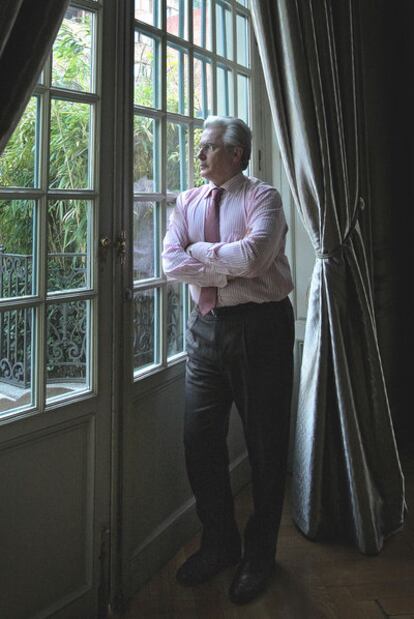"There has been a relentless pursuit of my life since I uncovered Gürtel"
Judge Garzón pours his heart out for the first time in a new documentary
High Court Judge Baltasar Garzón believes that the legal persecution against him began when he started investigating the Gürtel corruption network. From the day he ordered the arrests in February 2009 of Francisco Correa?the alleged mastermind behind a multi-million-euro kickbacks-for-contracts scheme?and several accomplices, Garzón's life has become very unpleasant indeed.
Three ethical and criminal investigations into his actions as a judge were opened, based on complaints filed by right-wing groups and other individuals. They include allegations that he violated his bench duties by trying to open an inquiry into Franco-era crimes, which are technically protected under an amnesty; that he illegally ordered jailhouse recordings between chief Gürtel suspects Correa and Pablo Crespo and their lawyers, which should be classed under the attorney-client privilege; and that he asked for and received money from Banco Santander to organize a series of lectures on human rights at New York University in exchange for dropping a tax fraud case against bank chairman Emilio Botín.
"Many ask, 'Do you feel condemned?' Yes. Am I a condemned man? No."
"Where the hell is there a single payment from Banco Santander to me?" Garzón asks in a new documentary by Catalan filmmaker Isabel Coixet, which will premiere next Monday at the Berlin Film Festival (Berlinale).
Escuchando al juez Garzón (Listening to Judge Garzón) was filmed last December in a Madrid apartment that was lent to the producer for the occasion.
Besides the premiere, the film will have two other showings at Berlinale on February 15 and 17, and will then be available on the web at filmin.es.
In the 84-minute black-and-white documentary, Garzón tells the interviewer, writer Manuel Rivas, how incredulous he is over the accusations. "For the love of God, what is this? Why? Is it because my name is Garzón?"
The High Court judge, who was suspended from his duties last year, is now working as a special advisor at the International Court at The Hague.
"Many people ask me if I feel condemned. I say, yes. But am I a condemned man? No."
Garzón, who saw international recognition when he ordered an arrest warrant for former Chilean dictator Augusto Pinochet in 1998, questions why it is taking so long to put him on trial before the Supreme Court on any of the charges he faces. "The only thing I ask is that they put me on trial right now so I can defend myself..."
Referring to his investigation into Franco-era crimes, Garzón says that what caught his attention was the fact that after 70 years there was no group or organization that had compiled a document that identified by numbers or location the executed victims. "It is true that some regions had done this as well as some historical memory associations, but it doesn't exist at the level of the Spanish state.
"While at The Hague, I was given some information that an extreme rightwing group, Combat 18, had sent out emails saying, 'We have to finish off the judge because he is investigating Franco crimes.' I never said anything before, so I am saying it now for the first time."
Garzón says his current legal problems were sparked when he began the Gürtel inquiry, which has implicated dozens of once-influential businessmen and several Popular Party officials.
"From then on, with a masquerade created by certain media about the inquiry, began the relentless pursuit and harassment of my private and professional life, with constant complaints and accusations, just because I was investigating serious money-laundering crimes, which was my duty as a judge. Nothing more," he says.
As to the payments he reportedly received from Banco Santander, Garzón says: "OK, let them investigate what they want. They will find my salary, my copyright payments of the works that I have done, and the salary I've been able to earn from the university for the lectures I have given."

Tu suscripción se está usando en otro dispositivo
¿Quieres añadir otro usuario a tu suscripción?
Si continúas leyendo en este dispositivo, no se podrá leer en el otro.
FlechaTu suscripción se está usando en otro dispositivo y solo puedes acceder a EL PAÍS desde un dispositivo a la vez.
Si quieres compartir tu cuenta, cambia tu suscripción a la modalidad Premium, así podrás añadir otro usuario. Cada uno accederá con su propia cuenta de email, lo que os permitirá personalizar vuestra experiencia en EL PAÍS.
¿Tienes una suscripción de empresa? Accede aquí para contratar más cuentas.
En el caso de no saber quién está usando tu cuenta, te recomendamos cambiar tu contraseña aquí.
Si decides continuar compartiendo tu cuenta, este mensaje se mostrará en tu dispositivo y en el de la otra persona que está usando tu cuenta de forma indefinida, afectando a tu experiencia de lectura. Puedes consultar aquí los términos y condiciones de la suscripción digital.








































